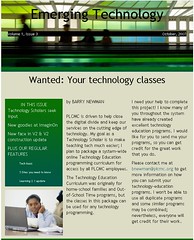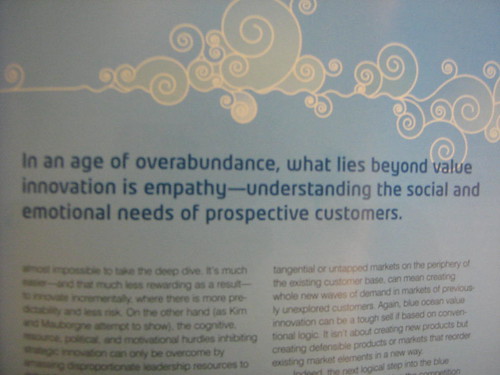Need a Holiday eCard. Try JibJab Sendables!
Now, if I could actually clone myself (like the video), I just might be able to get all my packing for the move done. :)
Have a wonderful holiday everyone !


"Even though Yahoo! Answers is so frequently sloppy and inaccurate, it's still the juggernaut in its field. Despite a rapid proliferation of answer-giving sites—Amazon.com's recently inaugurated Askville just joined a crowded field that includes Answerbag, WikiAnswers, AnswerBank, and Ask Metafilter—Yahoo!'s is still by far the most popular. And in the question-answering game, size matters. While the others have a few clever features (like Answerbag's efforts to separate "educational" and "conversational" questions) or a more specialized community, the sheer magnitude of Yahoo!'s community gives it the upper hand...
The lesson Yahoo! Answers teaches is that, for millions of people on the Web, it's less important to get a good answer than to get someone to listen to your question in the first place."
- The first is to inspire trust. You build relationships of trust through both your character and competence and you also extend trust to others. You show others that you believe in their capacity to live up to certain expectations, to deliver on promises, and to achieve clarity on key goals. You don’t inspire trust by micromanaging and second guessing every step people make.
- The second is to clarify purpose. Great leaders involve their people in the communication process to create the goals to be achieved. If people are involved in the process, they psychologically own it and you create a situation where people are on the same page about what is really important—mission, vision, values, and goals.
- The third is to align systems. This means that you don’t allow there to be conflict between what you say is important and what you measure. For instance, many times organizations claim that people are important but in fact the structures and systems, including accounting, make them an expense or cost center rather than an asset and the most significant resource.
- The fourth is the fruit of the other three—unleashed talent. When you inspire trust and share a common purpose with aligned systems, you empower people. Their talent is unleashed so that their capacity, their intelligence, their creativity, and their resourcefulness is utilized.
“Diagramming (analyzing or dissecting) a practice or an organization or a job doesn't create any energy or vitality in it. It simply dissects it. The spirit is in the doing. Innovation is doing...
Reading Florey's book reminds me that dissecting takes away the fluid nature--the very spirit--of language, just like peeling apart the layers of a practice to "make it more innovative" stalls out innovation all together. You can't create a diagram for innovation...
Doing does.”
"The ultimate objective of any innovation is to transform business and transform lives. How do you know if your innovation is of that transformational kind? Here are my definitions that I use for the different stages/types of business:I would argue that to win in the market, you need to aim your innovation efforts towards creating a transformational business."
- If you charge for undifferentiated stuff, then you are in the commodity business.
- If you charge for distinctive/differentiated tangible things, then you are in the goods business.
- If you charge for the activities you perform, then you are in the service business.
- If you charge for the time customers spend with you, then and only then are you in the experience business.
- If you charge for the benefit customers (or "guests") receive as a result of spending that time, you are in the transformation business.
How and why have you reinvented yourself or your organization?
I don't think reinvent is the right word. I think of it more as "evolving" to keep up with the information and cultural shift that is already happening. Why? that's easy ... it's *imperative* to remain current and relevant.
As for me personally, I have always viewed "lifelong learning" as a personal pursuit and not a just a library mission moniker. It's a personal responsibility to keep up on trends and be as close to the top of my game as I can. And as public servant, it’s also an expectation and community obligation.
Do you feel that products and services are determined by need, or do people develop needs based on products and services available?
Hmm... this is loaded question which to me seems based upon some assumptions. It's like the chicken and egg - which came first? The answer lies not in the choices themselves, but rather in realization that products and services are an *evolution* of the constant adjustment to changing customer needs. As users become more savvy and sophisticated (because of their exposure to better products and services) their expectations change and mature and it starts the growth cycle all over again. "
"Earlier this week I was unable to log in to Bank of America’s site. I thought about calling, but I hate navigating through phone trees (plus there is the fact that I do not sound like my husband–whose account I was trying to log in to–but we won’t go there). I was just about to give up until the following window popped up on my screen:
My first thought was, “How cool, I don’t have to talk to a person!” Yep, I am officially a geek. My second thought was, “Wouldn’t it be cool if we offered a service like this to patrons using our catalog.” After so many attempts to find an item a window would automatically pop up and offer to let the patron chat with a librarian."
 At the last conference I attended two weeks ago, I told the registration attendant to just keep the bag and only give me the program. Why? Because I’m tired of dated conference bags. They only seem to collect dust in my closet. Here’s proof. And this is just half the stash I pulled out from the top shelve in my continued quest to go through the closets and pare down before the move.
At the last conference I attended two weeks ago, I told the registration attendant to just keep the bag and only give me the program. Why? Because I’m tired of dated conference bags. They only seem to collect dust in my closet. Here’s proof. And this is just half the stash I pulled out from the top shelve in my continued quest to go through the closets and pare down before the move.  Getting ready for a move means going through boxes in deep closets that you haven’t looked at in awhile ... a looooong while. Today’s closet cleaning trip revealed a tray of slides that I had all but forgotten about... and the contents of which contained my very first
Getting ready for a move means going through boxes in deep closets that you haven’t looked at in awhile ... a looooong while. Today’s closet cleaning trip revealed a tray of slides that I had all but forgotten about... and the contents of which contained my very first "Though the Kindle is at heart a reading machine made by a bookseller—and works most impressively when you are buying a book or reading it—it is also something more: a perpetually connected Internet device. A few twitches of the fingers and that zoned-in connection between your mind and an author's machinations can be interrupted—or enhanced—by an avalanche of data. Therein lies the disruptive nature of the Amazon Kindle. It's the first "always-on" book."

“Yesterday was Webkins Day at the Library! This meant a whole bunch of fun, chat and getting to know a group of kids in a very new way. Matthews Branch Library (Thanks, Trish!) here at PLCMC hosted two back-to-back Webkins Club programs for kids…”
Read the full post.

"If it hadn't been for library bloggers I would never have:
- started reading blogs
- started reading the library literature more widely
- started writing book reviews for the library literature
- started reading outside my profession for parallel experiences and new ideas
- started my own blog, to share my own experiences …
I have progressed more professionally in the last 3 years, than I had in the previous 19. Even though my job title hasn't changed much, the work that I do, my love of it and my wider knowledge of the profession has grown exponentially (and there is potential in the job situation, so that may better reflect this development soon too).
And it's all because library bloggers out there unselfishly decided to take the time to share their thoughts, experiences and more. They took a risk, put themselves out there, not knowing whether anyone would read and I again want to say thanks. I am more in love with my profession, my work and the life-long learning process that I am again engaged in, than I have ever been before. They are an inspiration to me, they give me inspiration to make the changes, small and large, to help make my library service better for our users - as a professional, I could not ask for a better gift from my profession."

 This is the third mention in the last week that I’ve seen regarding Human Sigma, a new book that's only been out about two weeks now. Judging from this except in last week’s Gallup Management Journal ( Yup, the folks that do the polls), I think it’s moving to the top of my list.
This is the third mention in the last week that I’ve seen regarding Human Sigma, a new book that's only been out about two weeks now. Judging from this except in last week’s Gallup Management Journal ( Yup, the folks that do the polls), I think it’s moving to the top of my list.“Culturing culture
Having a high-performing business culture is a competitive advantage today. Most companies expect every employee to be a builder, because every employee, through his or her actions, either makes the culture stronger or weakens it. Employees, in turn, want to be proud of their organizations and local teams. And, in many countries today, the employer needs the employee more than the other way around. As the world shifts from an industrial to a knowledge-based economy -- and as employees are increasingly valued for what they know as much as for what they produce -- the employer’s power has diminished or evaporated.
So how do we manage people for success and high levels of productivity in the new economy? Too many organizations build management models on the assumption that managers and leaders have the power in the company/employee relationship, but that’s no longer always the case. The answer is employee engagement or the ability to capture the heads, hearts, and souls of your employees to instill an intrinsic desire and passion for excellence. Engaged employees want their organization to succeed because they feel connected emotionally, socially, and even spiritually to its mission, vision, and purpose.”

 When Kelly Czarnecki first shared this exciting news with me, it wasn’t the fine paying part that blew me away. It was instead the fact that the teens, themselves, had figured out a way to bridge a real life library
When Kelly Czarnecki first shared this exciting news with me, it wasn’t the fine paying part that blew me away. It was instead the fact that the teens, themselves, had figured out a way to bridge a real life library  I picked up Wired at the airport before boarding the plane. The cover story on Manga was extremely interesting and offered up some excellent thoughts, especially related to copyright, intellectual rights and the rise of dojinshi :
I picked up Wired at the airport before boarding the plane. The cover story on Manga was extremely interesting and offered up some excellent thoughts, especially related to copyright, intellectual rights and the rise of dojinshi :"This odd situation exposes the conflict between what Stanford law professor (and Wired contributor) Lawrence Lessig calls the "read only" culture and the "read/write" culture. Intellectual property laws were crafted for a read-only culture. They prohibit me from running an issue of Captain America through a Xerox DocuColor machine and selling copies on the street. The moral and business logic of this sort of restriction is unassailable. By merely photocopying someone else's work, I'm not creating anything new. And my cheap reproductions would be unfairly harming the commercial interests of Marvel Comics.
But as Lessig and others have argued, and as the dojinshi markets amply confirm, that same copyright regime can be inadequate, and even detrimental, in a read/write culture. Amateur manga remixers aren't merely replicating someone else's work. They're creating something original. And in doing so, they may well be helping, not hindering, the commercial interests of the copyright holders. Yet they're treated no differently from me and my hypothetical Captain America photocopies. The result is a misalignment between the emerging imperatives of smart business and the lagging sensibilities of old laws."
“ Since the program was both voluntary and optional for staff to participate in, and provided a reward, it was important that it not be discriminatory. Besides, it’s not only those that work with the public that need to be familiar with these new tools. In our library system we’ve also incorporated many of these tools in our staff communication on our intranet. For example, our system wide strategic plan is available for all staff via a wiki and many departments use blogs for communication. With this in mind, it would be shortsighted to only think that public service staff could benefit from the program. Everyone who works in libraries should be given the opportunity to learn.”
 I only had a few short minutes between meetings to meet the terrific threesome (Erik, Jaap & Geert) from the Netherlands that are crossing the country in a 27 foot tour bus and checking out libraries. But I was thrilled to see they were able to hook up with Matt Gullett, PLCMC’s Emerging Tech Manager, as well as Martin House and Mark Engelbrecht, (aka the Gaming Zone leadership team) and interview the three of them.
I only had a few short minutes between meetings to meet the terrific threesome (Erik, Jaap & Geert) from the Netherlands that are crossing the country in a 27 foot tour bus and checking out libraries. But I was thrilled to see they were able to hook up with Matt Gullett, PLCMC’s Emerging Tech Manager, as well as Martin House and Mark Engelbrecht, (aka the Gaming Zone leadership team) and interview the three of them.
Michael Welsh of the “Machine is Us/ing Us” has done it again… Information R/evolution.
"There is no shelf"
“The day you become a leader, it becomes about them,” Welch said. “Your job is to walk around with a can of water in one hand and a can of fertilizer in the other hand. Think of your team as seeds and try to build a garden. It’s about building these people,” he insisted. “Only you will know the team.”
That’s right. The minute you move from being a task-oriented professional to being a manager of people, it stops being about your individual talents, your successes, and starts being all about coaching, motivating, teaching, supporting, removing roadblocks, and finding resources for your employees. Leadership is about celebrating their victories and rewarding them; helping them analyze when things don’t go to plan."
 Well over a week ago, I took a drive down to South County Regional to check out their new circulation desk, but when I arrived I was pleasantly surprise to find that the transformation included much more than just self-check out.
Well over a week ago, I took a drive down to South County Regional to check out their new circulation desk, but when I arrived I was pleasantly surprise to find that the transformation included much more than just self-check out."LiteraTour" is a Grundtvig project within the EU "Programme for Lifelong Learning". Participants will be adult learners and staff in language schools and libraries in Belgium, Sweden, Germany, Spain and Greece. Project period: Oct 2007 - Sept 2009"
 Springwise ran an item today about Socks with a Story. It seems there’s a customer base for those who love socks, but love the connection to the grannies (and their stories) that knit them better.
Springwise ran an item today about Socks with a Story. It seems there’s a customer base for those who love socks, but love the connection to the grannies (and their stories) that knit them better. So I was very excited to see the new format that the Virtual Village had decided to use for the latest installement of the Emerging Technology newsletter. Instead of mocking up a slick pdf version and sending an all staff email like before, they decided to create it using LetterPop!
So I was very excited to see the new format that the Virtual Village had decided to use for the latest installement of the Emerging Technology newsletter. Instead of mocking up a slick pdf version and sending an all staff email like before, they decided to create it using LetterPop! "Nine- to 17-year-olds report spending almost as much time using social networking services and Web sites as they spend watching television. Among teens, that amounts to about 9 hours a week on social networking activities, compared to about 10 hours a week watching TV...
Overall, an astonishing 96 percent of students with online access report that they have ever used any social networking technologies, such as chatting, text messaging, blogging and visiting online communities, such as Facebook, MySpace and services designed specifically for younger children, such as Webkins and the chat sections of Nick.com. Eighty-one percent say they have visited a social networking Web site within the past three months and 71 percent say they use social networking tools at least weekly."

In my opinion, this is very true. We have the same discussions over here in Austria and Germany. Where to go? What to do? How to defend against SEs?
I don't think these are the proper questions. The concept of a teaching library is to enable the learn process and to support it. Libraries must find the way back into the learning scenario of students, not the other way. The question is: how can we help students to achieve their (learning) goals?
greetings from Dornbirn, Austria
Mark Buzinkay
MB Informationdesign